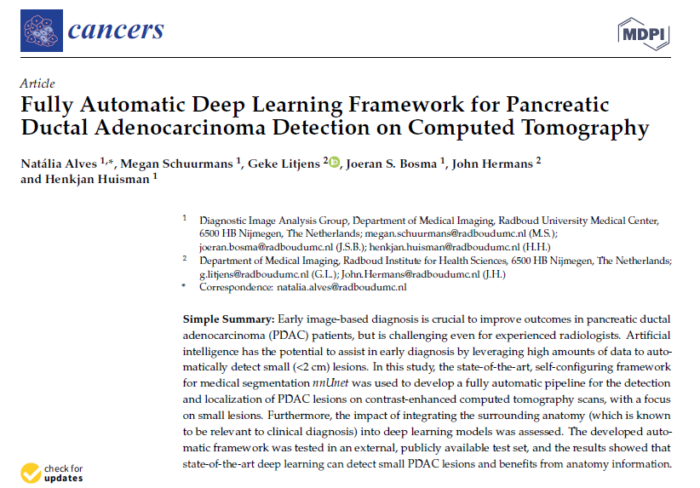We are proud of our Team from the PANCAIM coordinator, Radboud University Medical Center (RUMC) – Department of Medical Imaging, for publishing the first scientific article developed within the project: “Fully Automatic Deep Learning Framework for Pancreatic Ductal Adenocarcinoma Detection on Computed Tomography”.
The paper on deep learning for automatic pancreatic cancer detection was published by the open-access journal “Cancers” and is now available to read here: https://www.mdpi.com/2072-6694/14/2/376
The paper was co-authored by Natália Alves, Megan Schuurmans, Geke Litjens, Joeran S. Bosma, John Hermans and Henkjan Huisman. To learn more about the contributors to the article, check out the Key staff at https://pancaim.eu/consortium-partners/
Abstract: Early detection improves prognosis in pancreatic ductal adenocarcinoma (PDAC) but is challenging as lesions are often small and poorly defined on contrast-enhanced computed tomography scans (CE-CT). Deep learning can facilitate PDAC diagnosis, however current models still fail to identify small (<2cm) lesions. In this study, state-of-the-art deep learning models were used to develop an automatic framework for PDAC detection, focusing on small lesions. Additionally, the impact of integrating surrounding anatomy was investigated. CE-CT scans from a cohort of 119 pathology-proven PDAC patients and a cohort of 123 patients without PDAC were used to train a nnUnet for automatic lesion detection and segmentation (nnUnet_T). Two additional nnUnets were trained to investigate the impact of anatomy integration: (1) segmenting the pancreas and tumor (nnUnet_TP), (2) segmenting the pancreas, tumor, and multiple surrounding anatomical structures (nnUnet_MS). An external, publicly available test set was used to compare the performance of the three networks. The nnUnet_MS achieved the best performance, with an area under the receiver operating characteristic curve of 0.91 for the whole test set and 0.88 for tumors <2cm, showing that state-of-the-art deep learning can detect small PDAC and benefits from anatomy information.
Keywords: pancreatic ductal adenocarcinoma; deep-learning; early detection
Citation: Alves, N.; Schuurmans, M.; Litjens, G.; Bosma, J.S.; Hermans, J.; Huisman, H. Fully Automatic Deep Learning Framework for Pancreatic Ductal Adenocarcinoma Detection on Computed Tomography. Preprints 2021, 2021120001 (doi: 10.20944/preprints202112.0001.v1).

